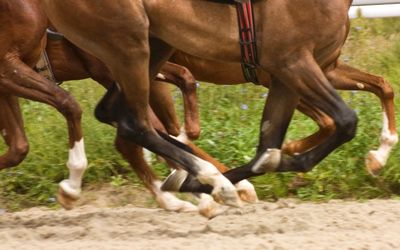US suspends visa processing in Zimbabwe, embassy says
African horse sickness claims lives of two more horses in Western Cape

Two more horses in the Western Cape have died as a result of African horse sickness, the provincial government announced on Wednesday.
African horse sickness is a serious, often fatal disease affecting horses, mules, and donkeys. It is usually spread by biting insects and occurs mainly in Africa, the Middle East and the Mediterranean.
The outbreak of the deadly disease in the Western Cape is likely to hamper the province’s horse export industry, which is worth R250m per year.
The provincial government said on Wednesday it was highly unlikely that it would be able to apply to have a movement ban the European Union (EU) placed on the horse industry lifted for at least another two years because of the outbreak of the disease. The Western Cape exports some of its horses to the EU via Mauritius.
Western Cape economic opportunities MEC Alan Winde said three more horses on the Paarl farm Schoongezicht, where the first case was detected last month, had tested positive for the disease.
“Four horses on four other properties also tested positive. Of these four horses, two have died.”
Mr Winde said the current containment zone, as revised last week, would remain in place until further notice. This meant that no movement of horses into, out of, through or within the containment area would be allowed without a movement permit from a state veterinarian.
“All the cases took place within the containment zone. At the start of the outbreak our vets predicted that if the illness should spread it would do so in the direction of the wind, which carries the midges. That is exactly what we have seen happen here. Vets will continue with their surveillance programme, which includes ongoing testing,” said Mr Winde.
He said that controlling the outbreak was a key priority for the provincial agriculture department.
“Currently, we are exporting our horses to the EU via Mauritius. This results in additional transport and logistics costs. As a result of these cases, it is highly unlikely we will be able to apply to have the movement ban to the EU lifted for at least another two years.”
At the end of last year, the largest consignment of horses ever was exported from the Western Cape to the United Arab Emirates and Europe, with the assistance of the department’s veterinary services programme, Mr Winde said. He said to increase these kinds of successes, the provincial government would attempt to ensure that the animal population remained disease-free, and would respond speedily to outbreaks should they occur.
“In this financial year, we will invest R86m to reach these objectives,” Mr Winde said.













Leave a Reply
Be the First to Comment!
You must be logged in to post a comment.
You must be logged in to post a comment.